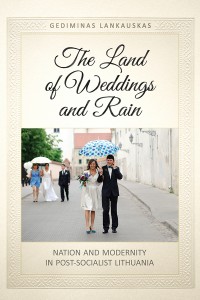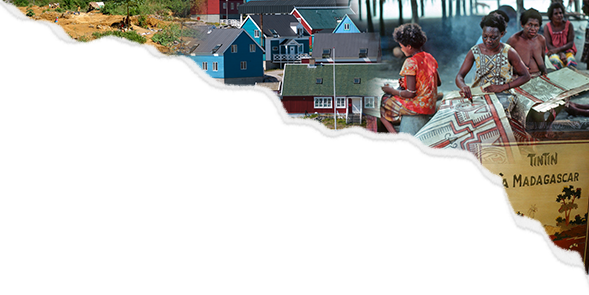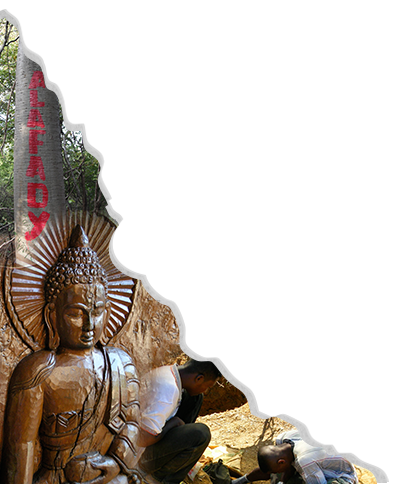In addition to all of the work we do in the Higher Education Division of University of Toronto Press to publish materials for undergraduate anthropology students—especially the Teaching Culture series of classroom ethnographies—we are fortunate to work alongside colleagues in our Scholarly Publishing Division who have as their focus the publication of new scholarship. In the lead-up to this week’s annual meeting of the Canadian Anthropology Society / Société canadienne d’anthropologie, we would like to highlight one of our colleagues’ most important series: Anthropological Horizons.
This series, started in 1991, focuses on theoretically informed ethnographic works addressing issues of mind and body, knowledge and power, equality and inequality, the individual and the collective. In the interview below, UTP’s current Acquisition Editor for Social Sciences, Douglas Hildebrand, discusses the origins of and the major contributions to Anthropological Horizons with the series editor, Michael Lambek (Canada Research Chair in the Anthropology of Ethical Life at the University of Toronto).
Douglas Hildebrand: Tell me a bit about how the Anthropological Horizons series got started.
Michael Lambek: I don’t have a very precise memory of how the series was started. I think that Prudence Tracey, who was a humanities editor at UTP, suggested the idea to Peter Carstens, then a senior professor in University of Toronto’s anthropology department. He suggested me as editor, for which I was and am very grateful. Both Prudence and Peter died much too young.
I was reading the German philosopher Hans-Georg Gadamer around that time and was very taken by his hermeneutic approach and his concept of “fusion of horizons,” which seemed to me the best description around for what takes place in ethnographic practice. Hence the title for the series, Anthropological Horizons. I would have preferred Horizons of Anthropology but it was already taken as the title of a book by Sol Tax. My appreciation of Gadamer was published in “From Method to Modesty: Essays on Thinking and Making Ethnography Now,” a long special section of the journal Culture 11(1-2) that I edited in 1991.
In starting the series, we were concerned to receive a sufficient flow of manuscripts and so we made the remit very broad. This was also the time of Writing Culture and so we were looking for new forms and open to interdisciplinary work. Our first volume, The Varieties of Sensory Experience, edited by David Howes (1991), initiated his long and highly original program of research on the senses. David’s PhD was from Oxford but he had studied earlier at Toronto. The second book, by Mark Nuttall, was, if I recall, a co-publication with a British Press; Arctic Homeland (1992) is a great ethnography of the Inuit in Greenland. The third volume was my own Knowledge and Practice in Mayotte (1993). I submitted it to UTP in order to show my support for the series and it received stringent anonymous reviews like all the other titles. The one privilege I had was to publish a long book; in retrospect I would have had more readers had I broken it into three shorter books, but I had fun with it.
Right from the first our books were up to a very high standard of refereeing and production. The high production values encouraged other authors to submit their work.
DH: Perhaps the series’ most widely recognized title and indeed one of University of Toronto Press’ most consistent sellers is Anne Meneley’s Tournaments of Value, which came out in 1996. I find that in my acquisition activities, that book is a reliable “calling card,” piquing the interest of prospective authors. Tell me some of the story behind that book. How did we get it into the series?
ML: Anne’s book is highly acclaimed and rightly so. What I recall is that Anne came to Toronto as a postdoc of Janice Boddy, who was then at UTSC with me, and I met her that way. Tournaments of Value is a model ethnography, a beautifully composed mix of elegant theory and rich ethnography. It was nominated for the book prize of the American Ethnological Society and came in as runner up, a significant professional acknowledgment, and clearly one that has stood the test of time. It is wonderful that the press is doing a 20-year new edition.
DH: I’m glad you mentioned our plans for a 20th-anniversary edition of Tournaments of Value in 2016. It will be good to have. Reflecting back on the past 20-25 years, how would you say the state of the discipline of anthropology has changed and the role of scholarly ethnography within that? And how has the Anthropological Horizons series reflected those changes?
ML: I understand anthropology as a kind of intellectual tradition composed of a series of ongoing conversations around a series of core subjects or problems and drawing from the history of previous rounds of conversation. At times new topics emerge and older ones get returned to. As the discipline grows larger it becomes more and more difficult to keep track of the various threads; moreover, as the Anthropological Horizons series recognized from the outset, some of the most interesting conversations happen at the edges of the discipline—with people in fields like philosophy, geography, history, or literature.
One recent trend in the discipline has been to focus on immediate political events; to be there during the Arab spring, for example, and then to write an article. Some of the most popular articles downloaded from American Ethnologist have been of this order. Anthropology helps elucidate what is going on and can bring in local voices and critical perspectives that the mainstream media or fields like political science might miss. A very different movement is to theorize more broadly from within and by means of ethnographic data. Here I would say that the open access online journal HAU has been leading the way, reminding the profession of the value of classical ethnography, of fieldwork carried out in depth, and of the questions that have been at the heart of anthropology since its modern inception—including topics like the gift, translation, ethical life, value, magic, historicity, and the nature of culture itself. HAU is reviving older works and starting a book series with the University of Chicago Press. One of their exciting projects is a retranslation of Wittgenstein’s Remarks on Frazer’s The Golden Bough with a series of commentaries by anthropologists on the individual remarks.
 Both these projects demand the ongoing production of good, in-depth ethnography and this is where the Anthropological Horizons series has been a significant and steady player over the years. By my count we now have some 48 books in the series. They address classic issues in contemporary contexts. Thus the new book by Gedis Lankauskas, The Land of Weddings and Rain (2015), takes up the subject of wedding rituals, deftly illustrating their significance in contemporary Lithuania and using them as a vehicle to understand how Lithuanians themselves understand their post-socialist condition and their place in the world. Comparable books from the series include Tanya Richardson’s Kaleidoscopic Odessa (2008), an account of life in Odessa that draws on the popular tours of the city, or Nicola Mooney’s Rural Nostalgias and Transnational Dreams (2011) on the aspirations of Punjabi Sikhs. Quite a number of the books focus on the lives of indigenous people, several within Canada, but also in Latin America, Australia, New Zealand, and Malaysia. We have a strong selection of work on Canada; in addition to those on indigenous people by Naomi Adelson (Being Alive Well [2000]), James Waldram (Revenge of the Windigo [2004]), Andie Palmer (Maps of Experience [2005]), and Thomas McIlwraith (‘We are Still Didene’ [2012]), among others, we have Eva Mackey’s book The House of Difference (2002) on Canadian multiculturalism and ethnographies of transnational communities by Nick Harney (‘Eh! Paesan’ [1998]) and Daphne Winland (We are Now a Nation [2008]). The series also includes excellent books on local cultural worlds such as those by Anne Vallely on Jain nuns (Guardians of the Transcendent [2002]), Sylvie Poirier on Australian Aboriginal dreaming (A World of Relationships [2005]), Todd Sanders on Tanzanian rainmakers (Beyond Bodies [2008]), and Carlos Londoño Sulkin on personhood in the Colombian Amazon (People of Substance [2012]).
Both these projects demand the ongoing production of good, in-depth ethnography and this is where the Anthropological Horizons series has been a significant and steady player over the years. By my count we now have some 48 books in the series. They address classic issues in contemporary contexts. Thus the new book by Gedis Lankauskas, The Land of Weddings and Rain (2015), takes up the subject of wedding rituals, deftly illustrating their significance in contemporary Lithuania and using them as a vehicle to understand how Lithuanians themselves understand their post-socialist condition and their place in the world. Comparable books from the series include Tanya Richardson’s Kaleidoscopic Odessa (2008), an account of life in Odessa that draws on the popular tours of the city, or Nicola Mooney’s Rural Nostalgias and Transnational Dreams (2011) on the aspirations of Punjabi Sikhs. Quite a number of the books focus on the lives of indigenous people, several within Canada, but also in Latin America, Australia, New Zealand, and Malaysia. We have a strong selection of work on Canada; in addition to those on indigenous people by Naomi Adelson (Being Alive Well [2000]), James Waldram (Revenge of the Windigo [2004]), Andie Palmer (Maps of Experience [2005]), and Thomas McIlwraith (‘We are Still Didene’ [2012]), among others, we have Eva Mackey’s book The House of Difference (2002) on Canadian multiculturalism and ethnographies of transnational communities by Nick Harney (‘Eh! Paesan’ [1998]) and Daphne Winland (We are Now a Nation [2008]). The series also includes excellent books on local cultural worlds such as those by Anne Vallely on Jain nuns (Guardians of the Transcendent [2002]), Sylvie Poirier on Australian Aboriginal dreaming (A World of Relationships [2005]), Todd Sanders on Tanzanian rainmakers (Beyond Bodies [2008]), and Carlos Londoño Sulkin on personhood in the Colombian Amazon (People of Substance [2012]).
A final theme I will mention is works that articulate the ethnographic with the historical, including those by Peter Gose on the Andes (Deathly Waters and Hungry Mountains [1994]; Invaders as Ancestors [2008]), Albert Schrauwers on Sulawesi (Colonial ‘Reformation’ in the Highlands of Central Sulawesi, Indonesia, 1892–1995 [2000]), and the collection edited by Gavin Smith and Gerald Sider on historical silences and commemorations (Between History and Histories [1997]).
DH: Thank you, Michael. With four new titles releasing this season—the aforementioned The Land of Weddings and Rain, Girish Daswani’s Looking Back, Moving Forward, Cristina Moretti’s Milanese Encounters, and Antonio Sorge’s Legacies of Violence—and so many proposals coming in, it seems the Anthropological Horizons series has a bright future.
ML: A very bright future, especially when you consider the very talented new faculty and advanced graduate students with so many exciting projects. We are open for proposals!



